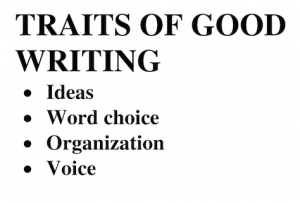by Elle Ray | Jul 26, 2013 | Writing
The Problem with Creating Effective Writing
Anyone with a fourth-grade education thinks he can be a writer.
Writers aren’t like athletes, who have visible physical attributes that define their profession. We’re not like scientists who have a wall full of diplomas. We look like ordinary people, so it’s easy for an untrained and unproven writer to blend in.
If any literate person with a pencil and a notepad can sit down and write something, then what’s the value of a professional? It’s not our spelling or grammar. It’s our skill at rhetorical writing. It’s our imaginative use of words. It’s our ability to get to the heart of a message and verbalize it. It’s our uncanny knack for saying the right thing at the right time.

What Good Writing Does
Good writing, therefore, isn’t just spell-checked writing. Good writing serves a purpose. It answers questions, makes the complex understandable, and fills a need.
For example, let’s say you have a website to sell cars. If your home page shows photos of the cars you sell and lists the technical specifications, it has some value. You know potential customers can come to your site, do their research, and decide if one of your cars is right for them.
But if your home page instead highlighted the cars’ best features and told stories about what makes your cars so great, you may get those potential customers to invest time and emotion into your products. You may be able to persuade those website visitors that not only are your cars great, but your company or dealership is the best place to buy them.
Why Good Writing Matters
We’re advocates of good writing not just because we’re writers. We want to see the world a better place, and good writing — good communication — helps move it in that direction. The art of writing is the art of storytelling. The art of rhetorical writing is the art of shaping a story to a target audience.
 You have a story to tell. You have a product or service to sell. The two merge in the message. Your website, your blog and your communications should all reflect your core story in understandable ways. Your business writing should reach out and attract, entice and tantalize. Good writing can accomplish this.
You have a story to tell. You have a product or service to sell. The two merge in the message. Your website, your blog and your communications should all reflect your core story in understandable ways. Your business writing should reach out and attract, entice and tantalize. Good writing can accomplish this.
Not Tricks, But Techniques
Good writing can combine business and pleasure. In other words, if you’re blogging about your catering business, you can write about the new royal boy named George and tie it into your business, whether through a special, a new item, or just a pondering about what the parents eat. It’s a technique that can potentially find a wider audience than people looking for caterers. And it works.
Another technique is to explore your business. There is more to catering, for example, than meets the eye, especially if the eye belongs to your customers. They don’t know what goes into making those delicious cakes and pies show up on time and piping hot. That’s what your blog can do; that’s what a blog is for: educating your customers. And if you can entertain them along the way, you’ll make friends and loyal fans.
This is what we do at Ray Access: we help you make fans. We help you reach out to potential customers with good writing techniques and stories that explain your advantage and uniqueness. Anyone can pick up a pencil, but not everyone can manage good writing. That’s why there are pros like us.
Ray Access is a content marketing firm that delivers targeted words to empower your business. Contact us about your specific project to receive a quote or discuss your needs. We write website copy, blog posts, e-newsletters and more. Everything we do is thoroughly researched, professionally edited and guaranteed original.
by Mark Bloom | Jul 17, 2013 | Website Content
Every Size Business Needs a Website, Period
Most savvy business owners today get a website before they even open their doors for business. While some actually need the site to run their companies, others do it just because everyone else is doing it. Is that a good enough reason to dump time and resources into something you’re not even sure you need?
If you’re a business owner, especially if you’re a small business owner, you know you have limited resources. Not just money, but time and energy, too. Building, maintaining and marketing a website, like any other business strategy, can use up those valuable, and limited, resources. Therefore, you should carefully consider your options and your needs before you rush to hire a web designer.

Go through the same process you would for any other business expense. Ask yourself why you need it, who you’re trying to reach and how it’s going to help you build your business. Know what you’re getting into before you invest. Below are our top four reasons to get a site of your own … as well as a few tips on when and how to use it.
1. Contact
Hardly anyone uses the yellow pages anymore. Is it worth the money to get your little square published alongside all your competitors? You’ll likely get a much better response with a good search engine hit. Even when people know your company name and just want to find your phone number, they’re more likely to search online through their home computers or smart phones than to pick up the yellow pages.
Make it easy for people — your prospective customers — to find you. Put your phone number, email address and physical address on your home page. Put this contact information in a conspicuous spot. In this era of instant gratification, visitors will click off your site in a heartbeat if they can’t find what they’re looking for. See our previous blog posts for other tips on how to optimize your website to attract visitors.
2. About You
Before future clients call you, however, they may want to find out a little bit about you and your company. Especially if your business requires a substantial investment, they will browse your site to see if you’re the right company to hire. For shoppers who do their research, provide clear, concise copy that highlights your goods and services. What do people need to know about your business to make the decision to hire you?
Furthermore, if your business is a brick-and-mortar destination, such as a restaurant or retail store, add a map or simple directions beside your address. Make this information easy to find. Make sure your hours of operation are listed on your home page too, because that’s one of the most common things customers look for online.
3. Unique Information
 Another good strategy for attracting potential customers is to provide information that’s not available anywhere else. That’s the value of a well crafted blog, newsletter or set of articles on your site. When people search for a related topic, they’ll see a link to your web page, and they are now one click away from your website.
Another good strategy for attracting potential customers is to provide information that’s not available anywhere else. That’s the value of a well crafted blog, newsletter or set of articles on your site. When people search for a related topic, they’ll see a link to your web page, and they are now one click away from your website.
How does this work? Here’s an example. According to the Pew Research Center, a think tank that tackles all kinds of interesting issues, 80 percent of all Internet users have used the web to look up health information. That’s 93 million Americans. If you can write about a health-related topic that ties into your own business, you can tap into that market. If you own a shoe store, for example, provide information about hammer toes and flat feet. Write about how your food is gluten-free or low-fat.
4. Entertainment
Don’t underestimate the power of engaging entertainment. Most Internet users go online to be entertained. Satisfy them by providing some gossip about your area or your industry. Add videos and links to YouTube that relate to your business. Add top ten lists, a la David Letterman, and share funny quotes.
Give your readers reasons to keep coming back to your website. Marketing is about keeping your name in front of their eyes on a regular basis. Make your site so inviting that visitors will bookmark it and send links to their friends. “Hey, did you hear about the joke that Auntie May’s Cookies put up on her site today?”
If you can accomplish these four things on your website, you’ll have a successful site … and likely, a successful business. To learn more strategies for improving your website, contact us today.
Ray Access is a content marketing firm that delivers targeted words to empower your business. Contact us about your specific project to receive a quote or discuss your needs. We write website copy, blog posts, e-newsletters and more. Everything we do is thoroughly researched, professionally edited and guaranteed original.

 You have a story to tell. You have a product or service to sell. The two merge in the message. Your website, your blog and your communications should all reflect your core story in understandable ways. Your business writing should reach out and attract, entice and tantalize. Good writing can accomplish this.
You have a story to tell. You have a product or service to sell. The two merge in the message. Your website, your blog and your communications should all reflect your core story in understandable ways. Your business writing should reach out and attract, entice and tantalize. Good writing can accomplish this.

 Another good strategy for attracting potential customers is to provide information that’s not available anywhere else. That’s the value of a well crafted blog, newsletter or set of articles on your site. When people search for a related topic, they’ll see a link to your web page, and they are now one click away from your website.
Another good strategy for attracting potential customers is to provide information that’s not available anywhere else. That’s the value of a well crafted blog, newsletter or set of articles on your site. When people search for a related topic, they’ll see a link to your web page, and they are now one click away from your website.